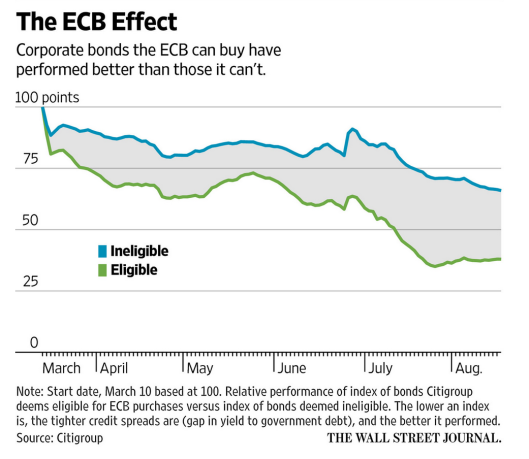Debt Seller’s Paradise
Things are so absurd in the Eurozone that the ECB is buying private placement debt with little regard for safety. In turn, private equity companies issue debt simply because they know in advance the ECB will buy it.
It’s a startling example of how the market is adapting to extremes of monetary policy, and it’s a safe conclusion the experiment will not end well.
The European Central Bank’s corporate-bond-buying program has stirred so much action in credit markets that some investment banks and companies are creating new debt especially for the central bank to buy.
In two instances, the ECB has bought bonds directly from European companies through so-called private placements, in which debt is sold to a tight circle of buyers without the formality of a wider auction.
Now, they are all but inviting private actors to concoct specific things for them to buy so they can continue pumping money into the financial system.
The furious central-bank buying has been a relief to companies and governments that can now borrow at rock-bottom interest rates. But it has also spurred criticism that the extreme policies are killing the returns available to other investors, such as pension funds, and loading up the economy and financial system with potentially overpriced debt.
The ECB was late to the central-bank party—it began quantitative easing only in 2015, years after the U.S., the U.K. and Japan—but it has embraced bond-buying with fervor. In March, it boosted its purchases to €80 billion ($90.6 billion) a month from €60 billion and surprised investors by saying it would soon add corporate bonds to its shopping list.
It had already bought so many government bonds that it was running out of things to purchase.
Private placements are private debt sales not open to the broader market, typically relying on a handful of investors that want to buy a company’s bonds. “Typically there won’t be a prospectus, there won’t be any transparency, there won’t be a press release. It’s all done discreetly,” said Apostolos Gkoutzinis, head of European capital markets at law firm Shearman & Sterling LLP.
The ECB executes bond purchases through the eurozone’s national central banks, which function like branches.
The Bank of Spain holds some of a €500 million private placement issued by Spanish oil company Repsol (MC:REP) on July 1, and some of a €200 million deal from Spanish power utility Iberdrola (MC:IBE) sold on June 10, two days after the ECB program got under way.
Both deals were solely arranged by Morgan Stanley and are the only private placements issued since the start of the ECB’s corporate buying program to have been bought by national central banks, according to the Journal analysis. Morgan Stanley declined to comment.
“We’re all looking at the data,” said the head of credit trading at a major European bank. “They’re only one new customer—but it’s a big one.”
And banks are rushing to serve it. Credit Suisse reshuffled its sales coverage of national central banks in recent weeks when the trading desk realized it wasn’t doing enough business with the new largest buyer in town, according to a person familiar with the matter.
ECB Effect

The ECB only announces what it will buy, not how much of it. Yet, that has spawned a guessing game driving yields lower and lower.
As soon as the ECB does buy an issue, the interest rate on those bonds collapse. And now we see private placement of debt, specifically designed with the ECB in mind.
QE is supposed to spur lending and investment. In practice, it’s killing pension plans while fostering bond bubbles.
As long as the companies do not default, the ECB can simply hold the debt to term, just as the Fed is doing now. Meanwhile, the bubbles continue to inflate.
